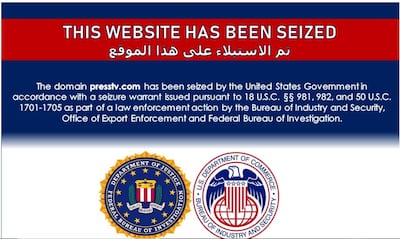American authorities took down several Iran-linked news websites on Tuesday, the US Justice Department said.
The move appeared to be a far-reaching crackdown on Iranian media amid heightened tension between the two countries.
The Justice Department said 33 of the seized websites were used by the Iranian Islamic Radio and Television Union, which was singled out by the US government last October for what officials described as efforts to spread disinformation and sow discord among American voters before the 2020 presidential election.
The US said three other seized websites were operated by the Iran-linked Iraqi militia group Kataib Hezbollah, which more than a decade ago was designated a foreign terrorist organisation.
The website domains are owned by US companies, but despite the sanctions, neither the IRTVU nor Kataib Hezbollah obtained the required licences from the US government before using the domain names, the Justice Department said.
The announcement came hours after Iranian state-run news agency Irna reported the US government seizures, without providing further information.
On Tuesday, the addresses of a handful of sites – including Iran state television’s Press TV, Yemen's Houthi rebel-run Al Masirah satellite news channel, and Iranian state TV’s Arabic-language channel Al Alam – displayed a federal notice.

The notice on the websites said they had been seized “as part of law enforcement action” by the US Bureau of Industry and Security Office of Export Enforcement and the Federal Bureau of Investigation.
Yemen’s Houthi rebels said Al Masirah had gone offline without prior notice, but that its mission of “confronting the American and Israeli acts of piracy against our nation by any means" would continue.
The US government also took over the domain name of the news website Palestine Today, which reports the views of Gaza-based militant groups such as Hamas.
What is Iran's Press TV?
Press TV is the English-language service of state-run Islamic Republic of Iran Broadcasting.
There are no private television or radio stations in Iran and satellite dishes, while widespread, are illegal, giving the official broadcasting service a monopoly over the domestic market.
Marzieh Hashemi, a prominent Press TV anchorwoman who, in 2019, was a material witness in an unspecified criminal case and has appeared before a grand jury in Washington, told the Associated Press that the channel was struggling to "figure out the reasons" for the seizure.
US authorities set a precedent for the seizure under the government of former president Donald Trump.
Last October, the Justice Department announced that 100 websites linked to Iran's Islamic Revolutionary Guard Corps (IRGC) had been taken down.
The US said the sites, operating under the guise of genuine news outlets, were waging a "global disinformation campaign" to influence US policy and promote Iranian propaganda around the world.
There have also been attempts to block outlets such as Press TV from social media platforms. Google has blocked the Iranian broadcaster from YouTube.
The decision to seize the domains comes amid nuclear deal talks between the US and Iran in Vienna. Both sides say that negotiations are progressing, although no deal has been reached.
This week, Iran elected a new hardline president, Ebrahim Raisi, who said that although he would continue talks with the US, his country would be taking a tougher position.
How can the US government seize a website?
Seizing of websites by the US government is not uncommon, often in co-operation with domestic or international law enforcement agencies.
In October 2020, 92 websites linked to the IRGC were seized.
"Unauthorised exports of goods, technology or services to Iran, directly or indirectly from the United States or by a United States person are prohibited," the US government said at the time.
Those services included website domain name registration.
But it is not just sanctioned foreign government organisations or terrorist groups who could have websites shut down.
In 2012, the US government announced the seizure of a Canadian online gambling website, Bodog.com.
Gambling online was illegal in the US and, since the site’s domain was registered in the US, it fell under US legal jurisdiction.
That was the case even though the Canadian company was a “foreign based registrar”.
Websites registered with .com, .net, .us or .org are registered in the US by domain name registration services such as VeriSign, which has all .com websites, for example.
These companies therefore have to comply with US federal law and often co-operate with international investigations and operations against transnational criminal and terrorist networks.
"Various law enforcement personnel, around the globe, have asked us to mitigate domain name abuse, and have validated our approach to rapid suspension of malicious domain names," VeriSign said in 2011.
